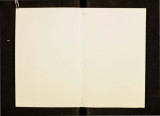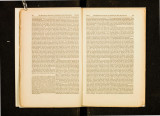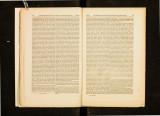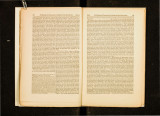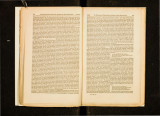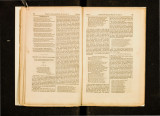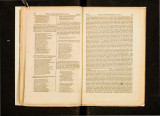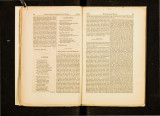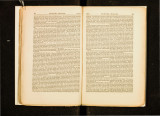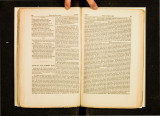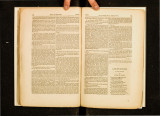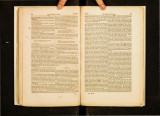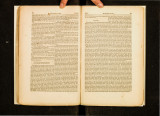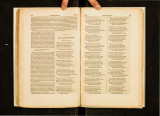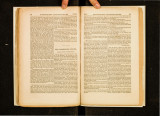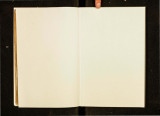| OCR Text |
Show 486 Bossuet and Robert Hall. (AuGUST, LXVIII. \Ve are no more a people of the free; A change is on onr furtnnes-.we forget The hirrh desirrn that made our hberty A thing nf hope and wonder, and have set Our hearts on earthly tdols, 'amtLes, The cluldtsh wants of fashton, and a cro\\d Of sordtd appetites that cbmor loud, The ear•cr ear of emptmess to please The nobler totls that only to lngh thought, Pat Jence, and lllw:nd struggle, ywld the pnze, Are ours no longer ,-we no more de' tse Conquests of self and fortune ,-all unwwnght That (J"lonous veJn our father's strnck of yore, Winch, left Un\\ ork'dl but makes us doubly poor . ath this subject, except tomb. Nor did he swk bene TJ e sermon to which as comp~red ~vith Boss~:~;,od, i~ by many eslecmed my alluston wJll be und_e reacher: but if read tothe finest_ effort of th.1 1: r,rntntypc, it will be laid t1e1her ,,·nh that of 1 1 · essive" ~side, as almost feeble and ummpr . 1 to Robert Hall's ser- The allusiOn iS C\ ~~l=n~r~Jcess Charlolle 1-hY-mon on the death of tl I dl credit !IS mfenonty to 111g read tins, I could 1 Jar 1 y prntntype whtch 1 had \\hat l\lr Hal!at~:? :,s 1 ~Hmer cun:1sny to read not then seen r d cour~es \\as snmulated these celebrated funera "J:s of s; able a cntJC Ac-b thJs extra\aO"ant eulory I h y I ~ d the earliest opportnnuy '' IJC cordmg:ly, smze lcnd 1d o::pccllnens offered, of procunng these most sp that~l ''as dis· of French eloquence 1 cannot say LXIX mnted Ill them • for they are cert:unly produc- The fnends that slill would l,eepthee from thy hom;, atwppo s of rare gem us, ~u 11d omf ngoibOl\e\ nsewn taimnde nstus,h hSmine- Yet pray that \\hen thou leal•'st them, \\Ills k~ng though~s, expr~sse s I llllpres~cd \\Lth thts, may be language. m~~hn:~~l:n:; to translate l\.Hl or three Meek and snhmJsstve • and the ocean foam that T \\as l b d u oratsons" for the columns Unroused by tempests. and the obedient sea, of the ~lost ce e rat~ the edJlOr \\ould have admit- A docile steed that needs no spur to g-oad, of the e_sseng:r, 1 . Nor )'et the anxious leash which Terror's hancl ted any tlnng of that d~sc~!ptwn. Bossuet T could Grasps doubtin..,., lest, all reckless of command, But with all my admJratL_nn_for H 11 ' It may The nnta:ned crea~ure flies the appointed .road! not discover his vast sup?nor~~· tot k~o~\·led.~e of Skies fa,·or thee and fortune-keep from tlls,- be my want of taste, or wsu ~~~e_n. tl at no,com- 1\'iake thee to reach thy !Iaven a?d embrace the French. language;. bu~ certa~:;lt~~~k~·me regard The pillars of tlly ancient dwelltng-pl~cc,- parison winch I h~\'C tnstl~t~t~~ o e of the finest pro- Hear all the well·known voices of thy hills, . "as ft!eble and 1\lllmpresSt\e rr n Enrrlish writers Ami those that, prattling up fr.om new. found nlls, ductions of a man, who: amonot~~;s de~idedly first, Grow happier, as they look tnto thy face. with whom I am acqu~Jnted, s_ . f Thomas with, perhaps, the stngle exceptiOn o Babington !\Iacaulay. . Beinrr thus compelled to (liffer with so emtnent a critic a~ 1\lr. Hallam, I have thoughtthat_aco~pa~ rison between the two produc.tions in quesl!~.m might BOSSUET AND HOBERT HALL. not prove entirely uninteresung to your. re,lde~s. Funr:ral discourses may ha,·e two obJects, e~the~ 1 lancin..,. over 1\fr. ITallam's exceedingly in- combined or sep;nate, one a tri_bute to the mer~t:: ter:stfog wo~k on the l;terature nf Eo rope, I was the dead, the other the m~ral :~·P~:;:;~;~: <~es;g~ struck with the following note ill that portwn o.f the survivors. The former. \\aS ~I .. p , delivered . k whi<"h treats of the celebrated "Or:nsons of those funeral enlogtes, \\hwh \\erep. na· ~~;ebres"of Bossuet. amoog the Greeks, Ho~a~= ~~da~:::~:oha~~~"ltt· "An Enol ish preacher of conspicuous renown tion~ .. 'l~he l~lt~~a~:gt;le main' purpos~ of Chrisfor eloquen~e was called upon, wit hi~ no great n.ate y ~~;:,n~er:.~ns. The tribute of admiration length of time, to emulate the funeral discourse of tt:t~ fu~ "d t the memory of those who have Dossuet on the sudden death of Hcn_riclla of Or- wl~::~~t~stl:~·ma~kind by genius, relieved their wants leans. He had before him a subj~Ct t_ncomparahl~ ~n b~nevolence, or defended the just cause by val_or, more deep in interest, more ferttle m. great :~e ~nerous and useful as may be the impulse whtch touchinrr associations; he had to descnbe not g that tribute is cert<tinlv a mauer of false so~rows of courtierd: not _the shriek of su~~:;. :~:~:~~~~;c~on~:: when cump;red with lhe religious surprise that echoed by mght Ill t_he halls fof so im ~essions which pious eloquence rna~ t~ake o~ seilles, not the apochryphal penttence o one I pI softened in the furnace of affiLctJon, ~n tainted hy the world'~ in~erconrs~, bu~ the manly '~~~:~ ma remain indelible throughout eterntty. grief of an entire nat ton t_n the w!lhen_ng of thos~ The differ~nce is as wide as that between the spaR ''iii>ions of hope which \\"at~ on the untncd ~o.uth o f the resent life, and that life bcynnd the grav~ Royalty, in its sympathy Wtth grat~d~ur ann.thdate:, :hich ~s "unmeasured by the flight of years. with beauty and innocence prectptlated Jnto t e 1845.] Bossuet and Rubert Hall. 487 The eloquence which is maiuly directed to this depart from their fundamental principles; when latter object, acquires a solemn earnestness and Catholics do it, they only come up to their prineimoral sublimity, which no eulogy of earthly great· pies. Hence we can perceive, why Bossuer, with ness can ever attain. his religious opinions, which he knew w Oe those of ln this respect it may be safely asserted, that the court, in whose presence he was speaking, Bossuet falls below llall, by directing more allen- should have attached far two much religious importion to an elaborate p:.negyric on tl1e departed, and tance to what Mr. Hallam has termed the 11 Apocless to the eternal interests of the survivors. I,of ryphal penitence of one so tainted Ly the world's course, do nut mean to atlirm that Dossuet has left intercourse." Hall was led into this fault neither pr:tctical impnwement of the occasion entirely out Ly his own opinions, nor by the temptations of his of \•iew. On the contrary, it must be admitted, situation. He knew that neither penance, nor alms, that he has many just and striking reflections. many nor other good deeds could smooth the path of even sublime ideas on eternity, some of which Hall may royalty to heaven. He neither feared nor hoped J1ave borrowed. l.lut I affirm that a f:tr larger por- any thing from the court. \Vhile, therefore, he tion of his discourse is devoted to praise of the did runple justice to the \'irtues of the lamented dead and flattery of the liviug, than Hall has given Princess, he had no motive to exaggerate the m, exto his j11stly deserved culogium of the Princess cept that which would have influenced every gen~ Chadutte, and expressions of condolence with her erous and feeling heart under the same circumfamily. This difference is not only real and appa - stances. rent, but the reasons fur it are obvious. Russuet was a courtier and an advocate of divine It has been justly said by Macaulay in one of rig-ht, in an age distinguished for servilit}' and adulahis unri\'alled essays, (1 quote not his words, hut tion. I do not suspect him of a temper so base as ideas,) that men of the highest genius, while they would have made him pander to his master's worst Iea\'e their impress on the a{!e iu which they live, p:~.ssions. But flattery is an infection, which even the never fail to receive a reciprocal impress from it. noblest and purest natures can not avoid in the atmos~ They are the mountain-tops which are illuminated phere of a court. No man can re:~.d Bossuet's tlisaome minutes earlier than the val lies by that light course on the death of Henrietta of Orleans, without which is soon equally ditfused over hill and dale. perceiving that he is deeply tainted. Hall lived in This remark is true only of those who, possessing an age and under circumstances widely difrerent. Jn the highest powers. devote them to great intellec- his time, servility was not the order of the day in tual and moral reforms. llut flossuet, with his con- England1 and even if it had been at court, he was fessed!y great abilities, had neither the inclination in no situation to make him servile. He was nei~ nor po\\"er to mark out a new path for himself. ther tutor of the king's sun, nor promoted by the Dedpitc his genius and piety, for I mean not to king's bounty. He belonged to a sect which had question his possession of the latter, Dossuet was ever denied the right of government to interfere a monau:hist, a Catholic and a courtier. He is with reli gion, and which had the glory of first J.oroaaid to have written the ablest defence of Catholic claiming and acting upon those p rinciples of uni~ principles ext::tnt, a defence, however, it is asserted, versa I toleration which the great Locke set forth so made good if at all by abandoning some of the most admirably forty years after in his unanswerable untenable positions of Catholicism. letters. 1t is true that H all had won the admira- Jf he di~l not advise Louis to that most execrable tion of the you nger Pitt, who pronounced a pasmeasure, tile re\'ocation of the edict of Na.ntes 1 he sage in one of !lis sermons before a body of \'nluncertainly did nnt dissuade him from a step so atro- teer soldiers, "equal to any thing either in ::tncient cious and unwise. By these statements T dn not or modern cloquence. 11 But he owed this fli_gh mean to insinuate th:tt the entertainment of Catho- praise to the real splendor of his genius, and the lie opinions prec/u(!cs a man from- being very elo- exalted se ntiments of patriotism which the passage quem and very pious, but merely to show that contained, and not to any effort which he had ever llossuet was not exempt from the frailties and pre- made to conciliate power. 1t was lwown that he judices of his age, growing out of Catholic bigotry had ad\·ocated liberal sen timeut in politics with all and intolerance. As a C:~. thol ic, I maintain that he his characteristic acuteness, perspicuity and power was more prone to exaggerate the alleged excel- of language. He had, therefore, nothing to f~ar or lencies of human characte r. Protestants believe hope from the court, but was left free to make a that man can not do enough to sa,·e himself; Catho- proper usc of the occasion, by paying a spontalics that l1e can do more, and that he can spare neous tribute to the memory of the dead, and fi;~ing from his treasury of gooJ works alms. as it were, the minds and hearts of the living on the frail nature for his poorer neighbors. h is natural, therefore, of the brightest hopes of earthly happiness and that Catholics, when they mean to eulogize, should grandeur. Supposing their genius to have been claim a higher degree of excellence for the objects equal, the circumstances mentioned would have of their praise than Protestants believe attainable. given the Euglishman a decided advantage. When Protestants exalt any one to pcrfection 1 they There is another poiut too iu which, and it is |


